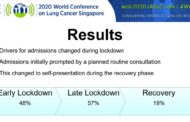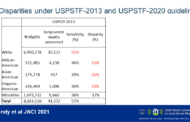Read the full articles for detailed summaries of each presentation.
TALENT: This national lung cancer screening study conducted in Taiwan in 12,011 individuals, uncovered the presence of lung cancer in 2.6% of the study population. These results are striking, not only because they exceed the 1.1% and 0.9% lung cancer detection rates documented in the US National Lung Screening Trial and the NELSON trial, respectively, but because the study was conducted in high-risk never-smokers as opposed to heavy smokers.
ITACA: “Despite its modest survival advantages cisplatin-based chemotherapy is considered the standard of care for early-stage completely resected non-small cell lung cancer,” said Silvia Novello, MD, PhD, of the department of oncology at the University of Turin, Italy, and presenter of the study. “There is still a need for identification of patients who will benefit from this approach.”
LCMC 3: Primary results of the phase II Lung Cancer Mutation Consortium (LCMC) 3 clinical trial suggest that neoadjuvant atezolizumab may be a worthwhile treatment option for selected patients with resectable stage IB-IIIB NSCLC. Not only did 21% of patients lacking EGFR or ALK genetic aberrations attain a major pathologic response at the time of resection, thus meeting the primary endpoint of the study, but 7% achieved a pathologic complete response. Moreover, 43% of 155 evaluable patients were downstaged followed neoadjuvant atezolizumab, whereas 19% were upstaged.
CodeBreaK 100: The first-in-class KRAS G12C inhibitor sotorasib has demonstrated early, deep, and durable responses in the treatment of advanced NSCLC with KRAS G12C mutations, according to results from this registrational phase II trial.
KEYNOTE-598: This phase III trial found that patients with metastatic NSCLC with a PD-L1 TPS ≥ 50% face greater toxicity without the benefit of enhanced efficacy when ipilimumab is combined with pembrolizumab in the first-line setting. In fact, the results at the first interim analysis for the immunotherapy combination were so underwhelming that the external data monitoring committee recommended stopping ipilimumab and placebo administration due to futility.
CONFIRM: Nivolumab significantly improved investigator-reported progression-free survival and overall survival compared with placebo in patients with relapsed malignant mesothelioma, according to preliminary results of this phase III trial.






